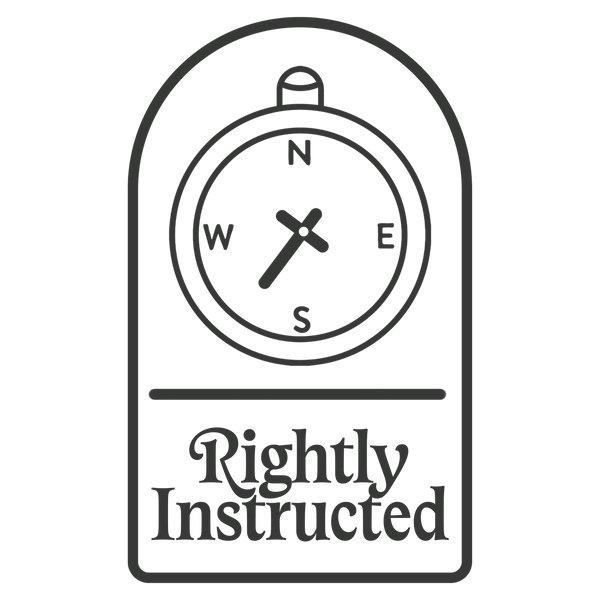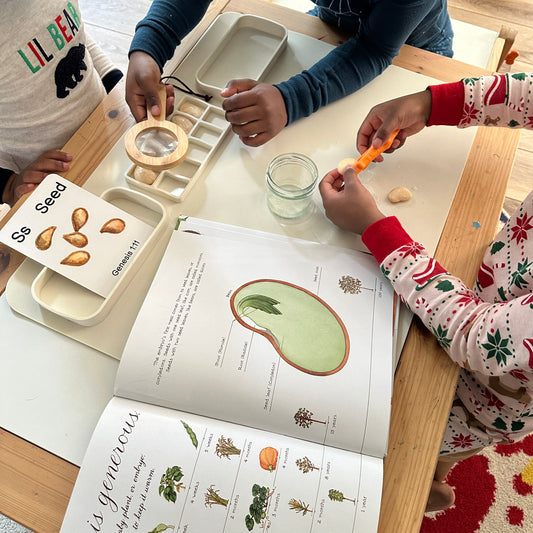
Tot School Routine
Share
Once you've got a concept of what to teach your toddler, the question becomes how? Developing a toddler learning or "tot school" routine will help eliminate your sense of overwhelm when it comes to teaching your early learner. It will also help your little one develop a sense of time and sequence (hey math skills!) as they learn what to expect and in what order in your daily family flow.
What is tot school?
Tot school is just the cute name for the intentional rhythm of reading and playing with children who are not quite old enough for preschool. Often it's the "school" little ones with older siblings demand for themselves because they want to be included in the learning fun!
There are no "rules" for what has to be taught in tot school, though you'll find plenty of beautiful printables and learning binders out there designed to spark learning and keep little ones busy. Rightly Instructed's resources spell out specific early childhood learning objectives achieved through fund hands-on exploration. All Compass Box mini unit studies and play prompts are flexibly designed to fit with your family's learning style.
A good toddler learning routine
A good toddler learning routine is whatever fits best with your lifestyle. That will look totally different for the toddler whose older siblings are homeschooled than it does for the toddler who is an only child with work-from-home parents.
Consistency helps develop a love and eagerness for learning. In general, children thrive with consistency. Structure and predictability boost social-emotional development by helping children feel secure. The result? Smoother, less tearful transitions as children learn what to expect next and greater enjoyment and focus on what's happening now.
Of course little ones need plenty of time for open-ended, independent play; but schedules and routines have their place. If you're looking for a gentle way to introduce some structure without tying your little one down too much, then these guidelines might help.
Tot school routine
Let's be honest. Toddlers are wildcards. With so many developmental milestones happening one after the other, it can feel like just when you get the hang of their schedule, they switch it up on you. For that reason, viewing your learning time as more of a rhythm than a routine may help take the pressure off a bit.
That said, a concept of time and order is a critical understanding to help your child develop. Using clear signals to help with these transitions will make them easier now and in school settings. Something as simple as a timer or alarm on your phone works well. So if you say "5 more minutes," make sure to keep an eye on the clock. Children learn what time feels like before they learn what it looks like.
Elements of a good toddler learning routine
Instead of planning according to the clock, map out an order of operations that fits with your family's normal flow. Those activities will naturally fall in to specific time windows that you can plan around. But when life happens and you're off schedule, your little one can still enjoy the consistency of their learning routine by following the same order, even if the timing is slightly off.
Each family will have its own variables (especially if there are sibling schedules to factor in), but below are the foundational elements of a solid tot school routine.
- Start with prayer. Doing so affirms that connecting with God is our top priority. It also provides an opportunity for us to talk to our little ones about including Him and His Word in all we do throughout the day.
- Get ready. This is where practical life skills come into play. Teach your child the importance of caring for their space by making their bed each morning. Let them practice caring for themselves as they pick out clothes, get dressed and brush hair. As they grow, let them gain more autonomy doing these things. (You'll want to handle most of the teeth-brushing for awhile though...)
- Independent play. Bottom line: each child needs time and space to let their own imagination run wild without adult intervention. Create a safe space (gated stairs, etc.) for them to play with toys or complete an activity while you prepare breakfast. We're fans of the breakfast invitations from Days with Grey. Bonus points if they have pretend food (or recycled ingredient containers!) with a few bowls and pots and utensils of their own to "cook" alongside you.
- Calendar time. Time and sequencing skills are further developed with a calendar routine. Singing simple "days of the week" and "months of the year" songs not only help them learn to memorize the names of the days and months, but it helps them conceive the pattern of time. You can build on this as they grow by talking about yesterday, today and tomorrow, and counting the numbers of the days. You can also talk about special dates like birthdays and holidays or other important days in your cultural or family.
- Get outside. Every day. Barring hazardous conditions, outdoor time is good for the soul and great for experiencing the weather and seasons God designed with all of the senses.
- Sensory play. This can be done inside or out, and you don't need a fancy sensory table to do it! A good plastic storage bin will do the job. These activities are great options for when you need to keep little hands busy while you attend to other responsibilities, or when you simply need an attention-getting stationary activity. Just be mindful that some sensory bin bases/fillers can present choking hazards for little ones who still sneak things into their mouths, so always have at least one eye on your child at all times.
- Reading. Don't get stuck with uninspiring baby board books. Choose titles with captivating illustrations and rich vocabulary that you enjoy reading. The booklists from Read Aloud Revival are super-organized treasure troves that will guide your library or book store searches.
Here's an example of what that might look like on any given weekday:
Devotion time
Self-care (get ready for the day)
Breakfast/free play
Calendar time
Outdoor exploration
Snack
Sensory play
Lunch
Reading time
Nap
Those are the essentials! It really doesn't have to be more complicated than that. Remember, children soak up every single thing that happens all day long, so they are always learning. The key to creating a richer learning experience is what you talk about while regular life is happening.
Narrating life and encouraging conversation is a wonderful way to teach your child what's going on around them. You can use moments in the car, at the grocery store, at the park, wherever to make connections and foster learning. And taking those opportunities to connect everything back to God is the most blessed and beautiful part of being part of those moments yourself.



